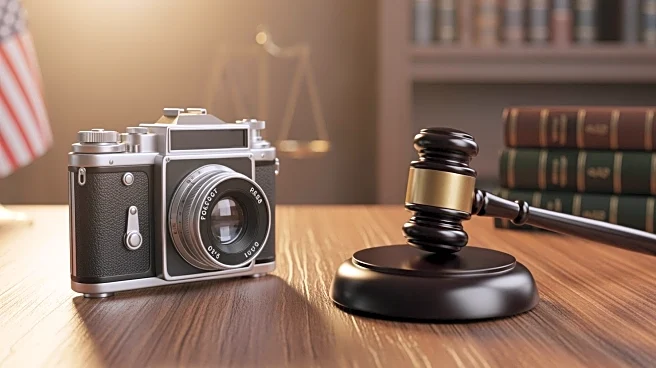What's Happening?
U.S. District Court Judge Sara L. Ellis has issued a temporary restraining order against U.S. Immigration and Customs Enforcement (ICE) and other federal agents, prohibiting the use of tear gas, pepper
spray, and weapons against journalists and peaceful protesters in Illinois. This decision comes in response to a lawsuit filed by Chicago-area media and individual protesters, aiming to protect journalists' rights to document federal agents' activities without facing physical threats. The ruling highlights concerns over the aggressive methods employed by federal forces under President Trump's administration, which have been criticized for targeting undocumented immigrants and using militarized tactics in Chicago. The restraining order is a significant victory for journalists and free speech advocates, emphasizing the importance of First Amendment rights amidst increasing public concern over their restriction.
Why It's Important?
The restraining order represents a critical defense of press freedom and the right to protest, particularly in the context of heightened federal enforcement actions in Illinois. The decision underscores the tension between federal immigration policies and local governance, as well as the broader implications for civil liberties in the U.S. The ruling may influence public perception of the Trump administration's handling of immigration and its impact on communities. It also serves as a reminder of the essential role journalists play in holding authorities accountable and ensuring transparency in government actions. The protection of journalists is vital for maintaining an informed public and safeguarding democratic principles.
What's Next?
Judge Ellis has expressed concerns that ICE may have already violated the restraining order, prompting her to demand explanations from Chicago ICE Field Office Director Russell Hott. The ongoing legal proceedings could lead to further restrictions on federal agents' actions in Illinois. Additionally, the Chicago Headline Club Foundation has launched an 'Essential Equipment Fund' to support journalists with safety gear, highlighting the continued efforts to protect press freedom. The situation may prompt further legal challenges and public demonstrations, as local and state officials, including Governor JB Pritzker and Mayor Brandon Johnson, continue to oppose federal militarized actions. The outcome of these developments could influence future federal enforcement strategies and policies.
Beyond the Headlines
The restraining order raises broader questions about the balance between national security and civil liberties, particularly in the context of immigration enforcement. It highlights the ethical considerations of using militarized tactics in civilian areas and the potential for such actions to incite unrest rather than maintain order. The case also reflects the ongoing debate over the role of federal authority in local jurisdictions, especially in Democrat-led cities and states. The implications for press freedom are significant, as journalists face increasing threats and accusations of 'fake news,' challenging their ability to report objectively and safely.









